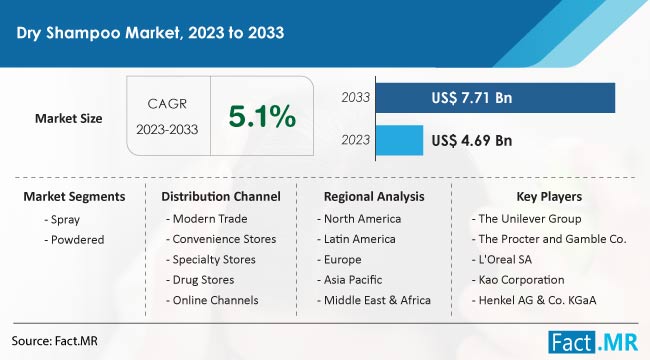Market Overview:
The global Dry Shampoo Market is gaining momentum as a convenient and innovative solution for busy lifestyles and evolving hair care routines. Dry shampoo, a waterless alternative to traditional shampoo, has emerged as a time-saving and versatile product that offers refreshed and voluminous hair without the need for a full wash. This trend is reshaping the hair care landscape and resonating with consumers seeking convenience, sustainability, and enhanced styling options.
For More insights into the, Request a Sample of this Report:
Key Players:
- The Unilever Group
- The Procter and Gamble Company
- L’Oreal SA
- Kao Corporation
- Henkel AG & Co. KGaA
- The Estee Lauder Companies Inc.
- Shiseido Company Limited
- Revlon Inc.
- Church & Dwight Co. Inc.
- Coty Inc.
Competitive Analysis:
In the fast-evolving dry shampoo market, both established beauty brands and niche players are vying for attention:
Batiste: As a pioneer in the dry shampoo category, Batiste offers an array of options catering to different hair types and preferences. Their focus on innovation and accessibility has solidified their market presence.
Living Proof: Known for its science-driven approach, Living Proof provides dry shampoos that promise effective oil absorption and freshening, appealing to consumers seeking high-performance products.
Klorane: Klorane’s dry shampoos often feature natural ingredients like oat milk, aligning with the clean beauty trend. They emphasize hair health while addressing the need for quick hair revitalization.
IGK Hair: This brand combines trendy packaging with innovative formulations, capturing the attention of style-conscious consumers looking for both performance and aesthetics.
Regional Outlook:
The adoption of dry shampoo varies across regions due to cultural norms, hair care habits, and lifestyle preferences:
North America: The fast-paced lifestyle in North America has contributed to the popularity of dry shampoo as a time-efficient solution. Consumers are also drawn to eco-friendly options that reduce water consumption.
Europe: European markets, with their focus on sustainability and convenience, have embraced dry shampoo as an ally for in-between washes, especially in countries where water shortages are a concern.
Asia-Pacific: Rapid urbanization and changing beauty perceptions are driving the demand for dry shampoo in the Asia-Pacific region. Brands are tailoring products to cater to diverse hair textures and cultural norms.
Market Trends:
Several trends are shaping the dry shampoo market:
Sustainable Formulations: Consumers are seeking eco-friendly options with clean ingredients, prompting brands to develop dry shampoos that are both effective and environmentally responsible.
Hair Health: Brands are incorporating hair-nourishing ingredients like botanical extracts and vitamins to offer not just freshness but also benefits for hair health.
Styling Capabilities: Dry shampoos are evolving into multi-purpose products that offer styling and texture enhancement, blurring the lines between traditional hair care and styling products.
Color-Specific Formulations: Brands are recognizing the diverse hair colors and tones, offering dry shampoos tailored to specific hair shades to avoid any visible residue.
Travel-Friendly: Dry shampoos are becoming a staple in travel bags, offering travelers an easy way to refresh their hair on the go without the need for water.
Conclusion:
The dry shampoo market is transforming how consumers approach hair care and styling. As modern lifestyles demand efficient solutions, dry shampoo has emerged as a time-saving and versatile tool for reviving and styling hair. With brands continuously innovating to address diverse hair types, preferences, and sustainability concerns, the dry shampoo market is shaping the future of hair care by offering a fresh perspective on convenience, efficiency, and hair health.
